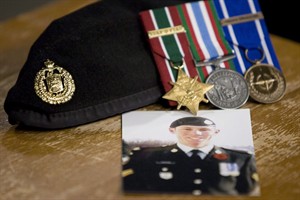
Secret military report into soldier’s 2008 suicide blames victim and parents
OTTAWA – A previously secret military investigation into the suicide of Cpl. Stuart Langridge blames not only Langridge himself for the tragedy, but also his biological parents, who divorced when he was five.
The board of inquiry report released Thursday was written nearly six years ago, a few months after the 28-year-old was found hanged in his Edmonton barracks.
National Defence had refused to release the findings to his parents, one of the reasons his mother Sheila and stepfather Shaun Fynes complained to the country’s military police watchdog.
They were given a censored version of the report on Wednesday, a day after the Military Police Complaints Commission issued a sharp rebuke about the way the suicide case was handled — and eventually botched — by inexperienced and negligent investigators.
The details of the military’s internal investigation outraged the Fynes, who rejected its arguments.
“This is an ongoing nightmare,” Sheila Fynes said in a statement. “These gratuitous comments are outside the accepted bounds of humanity, decency and civility.”
The censored report had been released to the commission during its exhaustive public inquiry into the handling of Langridge’s death and the family had hoped to see the entire document when they met defence officials.
That didn’t happen and large swaths of the report, including conclusions and the remarks of generals, have been removed.
Boards of inquiry are technical investigations, usually to see if the military can learn anything from the death of a member, but most of the report into Langridge dealt with his personality issues, including severe drug and alcohol dependency.
The 1,434 pages contain little analysis of what the military did to help him, blaming his suicide on the end of his relationship with his common-law spouse and his addictions, which it attributed to the break-up of his parents.
The most the report offers is that the young soldier, who did two overseas tours, “was offered numerous treatment options as the health-care team, tried to find an option that suited Cpl. Langridge’s needs.”
It also said he was offered “numerous programs to overcome his addictions and depression” but that he “exhibited help-seeking/help-rejecting behaviour.”
There was little evaluation of the adequacy of facilities, even though the report acknowledged Langridge had to be sent outside of the military medical system because of a shortage of beds.
Instead, the report repeatedly returned to the theme of a broken childhood.
“The board found the main source of stress for Cpl. Langridge was his personal relationship with his common-law wife,” said the analysis. “The divorce of his parents when he was five years old and the subsequent estrangement of his father was a traumatic personal event which left Cpl. Langridge with a fear of abandonment that pervaded his adult life and damaged and destroyed his personal and professional relationships.”
It dismissed what he witnessed Bosnia and Afghanistan as not relevant to his mental health, even though he told military doctors it bothered him.
“There is no indication anywhere in the evidence that Cpl. Langridge was exposed to a traumatic event during his military career,” it said.
Defence Minister Jason Kenney said Thursday he had not read the board of inquiry report, but promised to take action on the findings of the military police commission.
Join the Conversation!
Want to share your thoughts, add context, or connect with others in your community?
You must be logged in to post a comment.



















